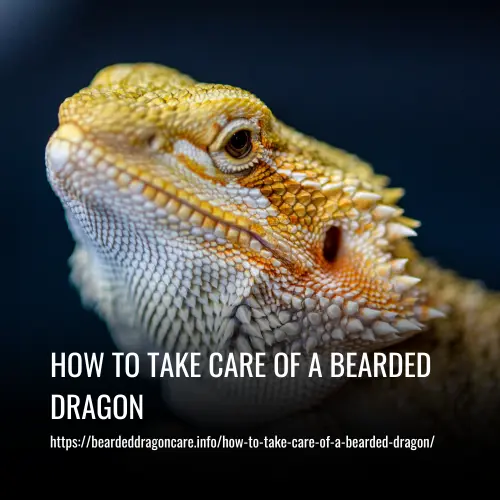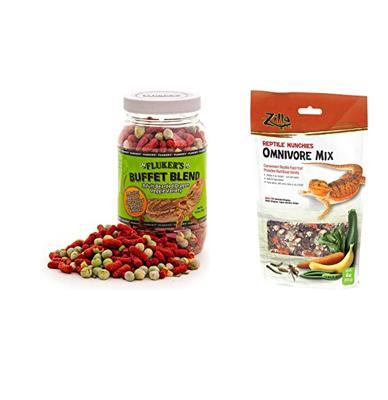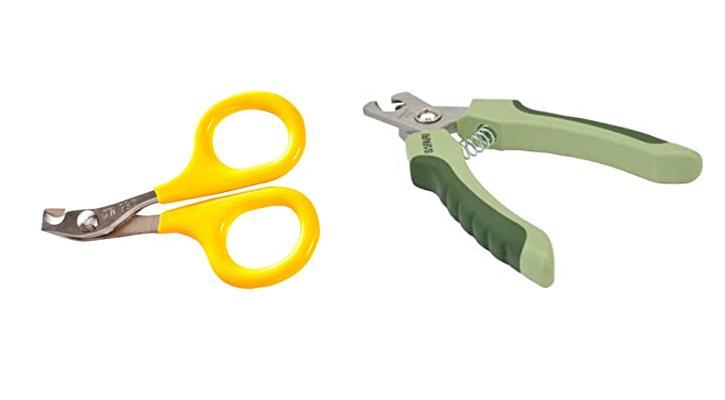Bearded dragons are one of the most popular reptiles as pets. They can add excitement and stimulation to your life with their peculiar personalities and behaviors. But if your bearded dragon is underweight, there could be a serious problem.
Underweight bearded dragons have a plethora of health issues that must be addressed in order to ensure long-term success in captivity.
In this article, we’ll look at possible causes of underweight bearded dragon syndrome and explore how you can help your pet achieve her ideal weight.
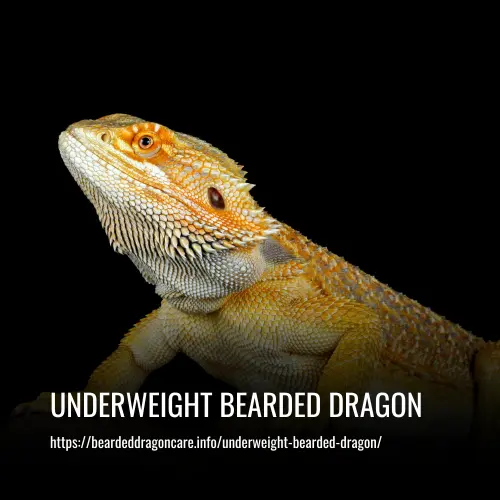
Bearded Dragon Weight
The weight of your bearded dragon is a crucial indicator of its health. When baby bearded dragons are born, they typically weigh the same as a single sheet of paper – which is really small! But they can grow rapidly, with some gaining up to 400x their birth size by adulthood. In fact, many of them will double in size within a week or less.
It’s important to keep an eye on the weight of your bearded dragon, making sure it is not underweight or overweight. If your bearded dragon is under 12 months old, you’ll want to make sure it’s gaining weight each month too. That being said, there isn’t one accepted size for a grown beardie – like people, some are simply inherently going to be bigger than others.
Bearded Dragon Weight Chart
| Age | Weight |
|---|---|
| 1 Month | 4-6 grams |
| 2 Months | 8-40 grams |
| 3 Months | 20-110 grams |
| 4 Months | 40-115 grams |
| 5 Months | 100-150 grams |
| 6 Months | 180-225 grams |
| 7 Months | 225-280 grams |
| 8 Months | 230-325 grams |
| 9 Months | 250-350 grams |
| 10 Months | 260-375 grams |
| 11 Months | 280-400 grams |
| 1 Year | 300-450 grams |
| 18 Months | 300-550 grams |
What is a Healthy Weight for a Bearded Dragon
A healthy weight for a Bearded Dragon depends on its age. Babies weigh between 4 and 6 grams when they are born, but can reach up to 20 grams by 3 months of age. As they grow into juveniles, they gain quite a bit of weight and can weigh up to 400 grams (roughly 14 ounces). In order to stay healthy, adults should maintain a weight of at least 400 grams or more.
It is important for owners to monitor the changing weight of their bearded dragon in order to make sure it stays at an appropriate level for its age. If your bearded dragon is not gaining enough weight, contact a veterinarian for help with designing an appropriate feeding schedule and supplementing if needed.
Signs of an Underweight Bearded Dragon
Recognizing the signs of an underweight bearded dragon is important in order to maintain its health. It’s easy to tell when your bearded dragon is underweight.
You’ll notice signs of food deprivation, such as a thinning or lack of fat stores in areas where these would usually be expected, especially during the brumation period. Here are some signs of an underweight bearded dragon.
Skinny Tail
Bearded Dragons are not normally known for storing much fat in their tails, however, a healthy one should have just a small amount. To check if your Bearded Dragon is healthy, touch its tail and feel for a slight squishy mass at the base.
If there is no squishy mass, it could be a sign that the Dragon is underweight and has no fat reserves stored elsewhere in its body. The tail will feel bony, which confirms that the Dragon has inadequate fat stores.
Skinny Legs
One of the most obvious signs of an underweight bearded dragon is skinny legs. You’ll notice that the bones in the legs are more visible and that the muscles are wasting away, resulting in a lack of muscle mass.
In comparison to a healthy beardie, there will be very little fat deposited around the legs and absolutely none near the armpits.
Disproportionate Head
One of the most obvious signs that your bearded dragon is underweight is its disproportional head. A healthy bearded dragon should have a head and body size that are proportionate.
However, if you notice that your beardie has a larger skull than the rest of its body, it could be a sign that it’s not receiving enough food. The skull size may appear too large for its body with eyes that are sunken into the sockets and look lifeless.
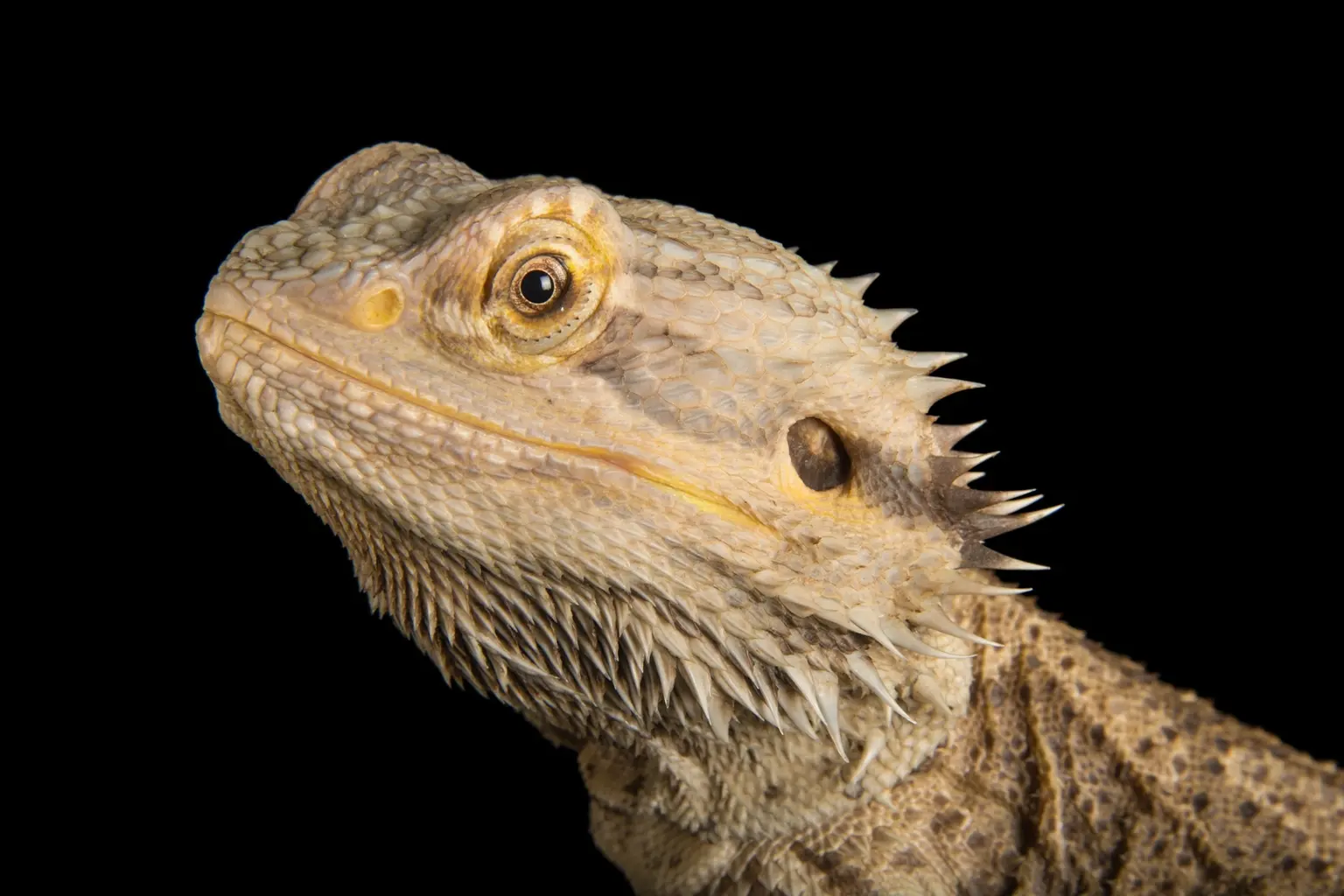
Visible Hips And Ribs
When it comes to spotting signs of an underweight bearded dragon, one of the most obvious signs is having visible hips and ribs. Even when your beardie has some fat surrounding them, its hip bones should still be visible.
If the bones are sticking out or noticeable, these are clear signs of severe malnutrition and should be addressed immediately.
Sagging Skin Across the Chest
A telltale sign of an underweight bearded dragon is sagging skin along the chest. This usually happens when your pet isn’t getting enough nutrition and its body isn’t properly hydrated.
In a healthy lizard, its skin should have some elasticity near joints – if you notice that your bearded dragon’s skin is becoming very loose or saggy, this may mean they are malnourished.
This can happen in other areas of the reptile’s body, but it’s most commonly seen around the neck and chest region which could indicate their food intake is too low.
Sunken Eyes
Sunken eyes can be an indication that a bearded dragon is underweight and malnourished. Normally, their eyes should have lively and alert looks with white, blue, or pink lids surrounding them. If a lizard’s eyes are sunken or lack the usual colored spot, this may be an indication of malnutrition leading to poor health and weight loss.
However, sunken eyes are not only signs of being underweight; they may also point out a health problem. Lizards that become severely dehydrated can have enlarged eye sockets and sunken eyes.
Diminished Fat Pads
A diminished fat pad on a bearded dragon is a warning sign of potential malnourishment and improper weight. Usually, the fat pads on these animals should be proportionate in size; so if you see them shrinking in size, then it’s an indication that your pet may need some extra nutrition to gain back their proper weight.
Bearded dragons’ fat pads are one of the best indicators of health status, but they can also tell us when our reptiles are too skinny. Without prominent fat pads around its head, this may indicate that your beardie needs additional nutrition to become healthy once again.
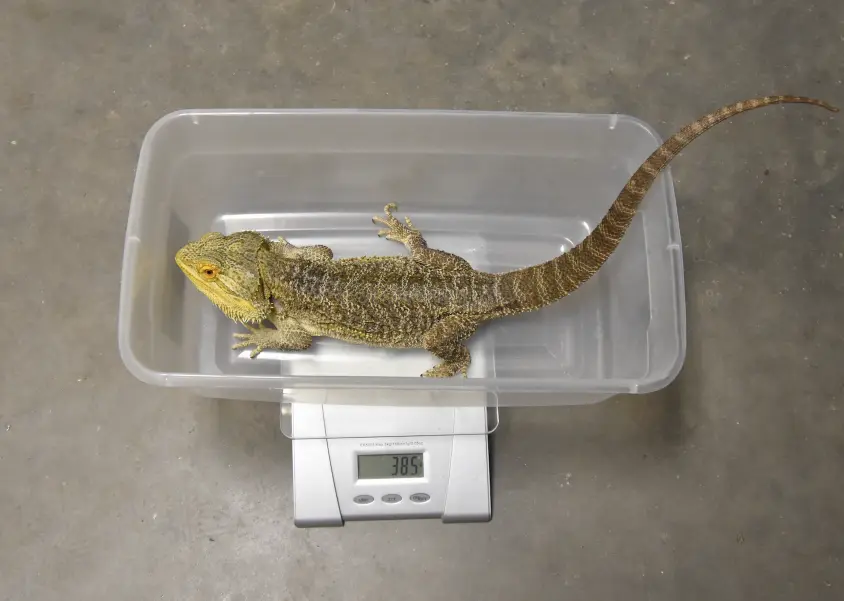
Reasons Why Your Bearded Dragon is Underweight
There are many possible reasons why your bearded dragon may appear to be underweight. Malnutrition is a common cause. However, other factors can also play a role in causing weight loss such as illnesses, parasites, and environmental stressors. Here are some Reasons for an underweight bearded dragon.
Inadequate Food
One of the main causes of an underweight bearded dragon is inadequate food. Without the proper amount of protein, bearded dragons simply don’t have enough nutrition to maintain a healthy weight over time. It’s important to pay close attention to your bearded dragon’s diet and make sure you’re providing an appropriate variety and amount of food.
Feeding them too little or not giving them enough variety can leave them without the proper sustenance they need. You should also make sure that your schedule for feeding is regular, as feeding on a hover once could lead to an unhealthy appetite pattern.
You should also avoid catering their meals mainly to fruits and vegetables; these alone won’t satisfy their need for meaty meals like insects and other sources of protein.
Ask your veterinarian for advice on the proper types of foods that are suitable for your Bearded Dragon in order to ensure they’re getting all the nutrition they need.
Dehydration
Dehydration is one of the main reasons why your bearded dragon may be underweight. If your pet doesn’t drink enough water, it can become severely dehydrated and result in extreme weight loss and other serious issues, including death if left untreated for extended periods of time.
Dehydration symptoms may present as sunken eyes and ears, dry skin, and mouth, wrinkled skin, increased panting due to heatstroke, and dark-colored fecal material with traces of blood. It’s important to make sure you’ve provided plenty of clean water when housing a bearded dragon so that they stay hydrated.

Parasites
Parasites are a very real issue when it comes to your bearded dragon’s health, and could be the reason why your beardie is underweight. Common parasites that might affect your pet’s weight include Coccidiosis, Pinworms, and Cryptosporidium.
Coccidiosis is highly contagious and often the leading cause of death in bearded dragons due to its transmission through feces. Pinworms, on the other hand, typically don’t cause much weight loss unless they enter the mouth or sinus area which then can prohibit them from even being able to eat!
It is important to maintain a clean environment for your pet so as to not promote these parasitic outbreaks. If your bearded dragon does become affected by one of these parasites, medical intervention should be taken as soon as possible.
Illness
Illness can be one of the top reasons why your bearded dragon is underweight. If you think your bearded dragon is unwell, the best course of action would be to take them to a reptile vet for an assessment and appropriate treatment.
If your bearded dragon has illnesses such as coccidiosis, mouth rot, and metabolic bone disease, their appetite may be affected and result in weight loss.
Unfortunately, some of these illnesses are not always easy to spot or diagnose, so if you notice that your beardless isn’t eating despite providing the appropriate amounts of food, it’s a wise choice to take them in for a check-up.
Aggression and Bullying
Aggression and bullying can be significant causes of weight loss in bearded dragons. If multiple dragons are in the same tank, they may feel competition for food and space, leading to aggressive behavior. This aggression can prevent the weaker dragons from feeding properly and cause them to become underweight.
If your bearded dragon is exhibiting signs of aggression such as chasing or nipping, it’s important to give them some time alone until they regain their strength back. Allowing the weaker dragon to continue getting bullied can result in permanent weakness and illness, so it’s best to intervene quickly before their health takes a turn for the worse.
Dental Problems
One of the most common reasons why a bearded dragon might be underweight is due to dental problems. This is a serious issue that affects both their ability to eat, and also can lead to malnutrition. If a lizard’s mouth is dry, it makes swallowing food more difficult, preventing them from taking in the necessary nutrients they need to stay healthy.
It’s essential that, if you suspect your bearded dragon might have any sort of dental problem, you should take them to the vet right away for some dental work.
Improper Lighting and Heating
Improper lighting and heating are major reasons why your bearded dragon can be underweight. Without the necessary heat, their ability to digest food properly is hindered due to the inability of enzymes to activate if it’s not present in their enclosure.
Additionally, UVB exposure is a must; otherwise, your scaly friend won’t be getting enough hours of exposure and will likely lose its appetite as a result. If you notice that your pet isn’t eating or drinking enough water even with adequate heat, take some time to check if your heating pads are working properly.
How to Fatten up a Skinny Bearded Dragon
Helping an underweight bearded dragon regain its weight can be a challenging process, but with the right steps and care, you can get your reptile friend back to full health.
Figuring out the root cause of your bearded dragon’s weight loss is the initial step. Knowing this will provide you with insights on how to best help it gain back to mass.
Increase Fatty Foods
Adding more fatty foods to a bearded dragon’s diet can be an effective method of helping it gain weight. Feeding them various insects such as mealworms, locusts, crickets, wax worms, and butter worms is an ideal solution to this, as they contain high levels of protein and fat.
If the situation isn’t too severe, you could also feed them pinky mice which will significantly raise their fat levels – though this should only be done if your dragon is at least 15 inches long.
For smaller dragons who are either 12 months or 18 months old, try feeding bugs 3 or 2 times a week respectively, until they have regained their weight. Of course, you still have to feed them cactus and even cilantro choppings for fiber intake so that impaction risk can be minimized.
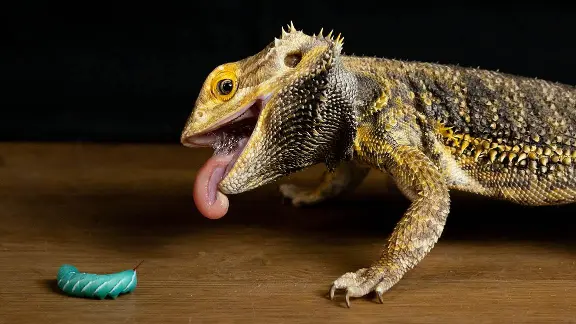
Provide Heat and Light Sources
Providing heat and light sources is key to helping an underweight bearded dragon gain weight. This isn’t optional as the reptile needs both sources of warmth to digest food and absorb nutrients properly. To do that, you need to use full-spectrum lights that are able to emit UV or UVB rays.
Additionally, infrared heating pads should also be used in order to maintain normal body temperatures. They should have a basking spot within their enclosure at between 88-100°F (or 31-38 degrees Celsius).
In order to create a more natural atmosphere, think about using ceramic heat emitters that provide warmth without any UV rays or low wattage incandescent bulbs. The type of emitter doesn’t matter; your lizard will still get the benefits either way!
Feed More Frequently
Feeding your bearded dragon more frequently is key to helping them gain weight. If your dragon is a baby, it’s important to feed them twice daily, as this will ensure that they get enough calories and fat for its growth. For adult bearded dragons who appear underweight due to inadequate food, you can feed them 3-4 times a week to see signs of improvement.
Meanwhile, growing, near-adult dragons should be fed as much as possible – offer as many bugs and other nutritious offerings as you can in a day so that the dragon has a chance to store the excess under its skin. Soon enough their weight gain should become apparent.
Treat Diseases and Get Rid of Parasites
Treating any underlying illnesses or parasites is key to helping your underweight Bearded Dragon gain weight. A visit to the reptile vet will help properly assess the health of your dragon, and provide appropriate treatment as well as advise you on the ideal diet for gaining weight.
It’s important to keep up with preventive care such as internal parasite medication every two weeks and annual external dewormer treatments. Regularly checking for signs of infection also helps tremendously in catching any problems before it becomes an issue.
If your Bearded Dragon is struggling to take food or water on its own, consider providing fluids through an oral syringe instead. This gives them the energy that they can use to properly digest and absorb nutrients, allowing them to put on healthy weight.
Provide Water
Providing water in the enclosure is an effective way to help an underweight bearded dragon gain weight. It is important to replace water on a regular basis in order to keep it clean. Providing plenty of clean, fresh drinking water will also help your dragon stay hydrated and healthy.
You can also offer your dragon natural sources of sweetness like orange rinds or apple cores in order to provide them with extra nourishment. Bottled fruit juices without added sugar are a great option because they offer fewer calories than their sugary counterparts while still providing essential nutrients and sweetness.
FAQs
What Can I Feed My Bearded Dragon to Gain Weight?
If your bearded dragon is looking thin and weak, consider adding fatty insects such as waxworms, mealworms, and super worms to its diet. These bugs contain more fat than other insects, which can help your beloved reptile gain weight and stay strong.
Why Won’t My Bearded Dragon Gain Weight?
To help your bearded dragon put on weight, you should first check its UVB setup, and then alter its diet for the best result. Most likely, if your dragon has below an ideal weight, both of these factors simultaneously play a role.
What to Feed a Malnourished Bearded Dragon?
Feeding your bearded dragon should include such items as apples, carrots, Romaine lettuce, strawberries, mangos, squash, peaches, collard greens, bok choy, kale, parsley, watercress, cilantro, Swiss chard, cabbage, bell peppers, and various insects like superworms, Dubia roaches.
Conclusion
In conclusion, an underweight bearded dragon is a serious health concern and owners should take quick action to correct the problem. Eating the right types of food in the proper ratio is key to getting your pet up to a healthy weight.
Additionally, providing them with plenty of light and other environmental necessities will help stimulate their appetite and metabolism. With these tips, you can get your scaly friend feeling better in no time!
